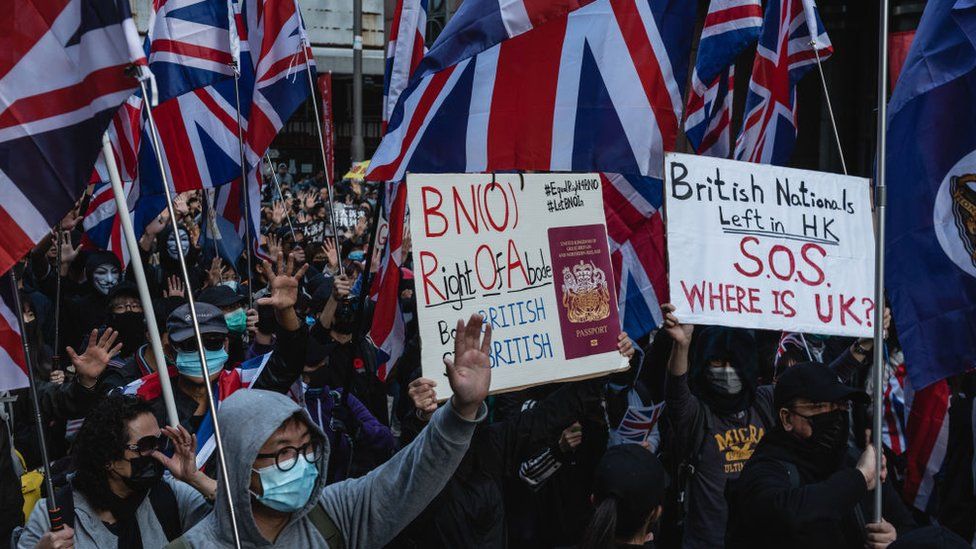Hong Kong: UK says new security law is 'deeply troubling'
- Published

Some protesters in Hong Kong have called on the UK to help
Foreign Secretary Dominic Raab said China's passing of a controversial national security law in Hong Kong is "a grave step".
He said China had ignored international obligations by taking new powers which could curb civil liberties.
Hong Kong's last British governor, Lord Patten, said the move had breached agreements made with the UK before the city was handed over in 1997.
Those agreements guaranteed certain rights for 50 years.
"Despite the urging of the international community, Beijing has chosen not to step back from imposing this legislation. China has ignored its international obligations regarding Hong Kong. This is a grave step, which is deeply troubling," said Mr Raab.
The foreign secretary said the UK would decide what action to take when it sees the full legislation, which has not yet been published.
Labour's shadow foreign secretary Lisa Nandy told Mr Raab in the House of Commons that he "must not waver" over his responsibilities to the people of Hong Kong.
Mr Raab said that "we fully intend to see through" plans to change visa rules to offer millions of people in Hong Kong a way to acquire UK citizenship.
Prime Minister Boris Johnson said he was "deeply concerned" about the law, but added he would not be drawn into "sinophobia" over other issues, such as the decision to allow Huawei equipment to be used in Britain's 5G mobile data network.
Hong Kong's chief executive Carrie Lam said the new law would fill gaps in the territory's national security legislation and would only affect a small number of people.
But with the city having seen increasing unrest and a widening pro-democracy movement, there are fears the law criminalising secession, subversion and collusion with foreign forces could mark the end of its freedoms.
'Route to citizenship'
Civil liberties, including the right to protest, freedom of speech and the independence of the judiciary, were enshrined in the Basic Law, Hong Kong's mini-constitution that came into effect with the end of British control in 1997.
The 50-year agreement is said to implement a "one country, two systems" principle, because it offers Hong Kong rights and freedoms that do not exist in mainland China.
Lord Patten, who oversaw the handover as governor, said the security law put an end to this principle and was a flagrant breach of the agreement between Britain and China.
The UK has previously said it will change its immigration rules and offer millions of people in Hong Kong a way of acquiring UK citizenship if the law is passed.
Prime Minister Boris Johnson said he would give extra rights to British National (Overseas) passport holders. Around 350,000 people in Hong Kong have this passport and a further 2.6m are eligible.
They would be allowed visa-free travel to the UK for 12 months, along with the right to work, which "could place them on a route to citizenship," Mr Johnson said.
- Published30 June 2020
- Published19 March
- Published3 June 2020
- Published29 May 2020